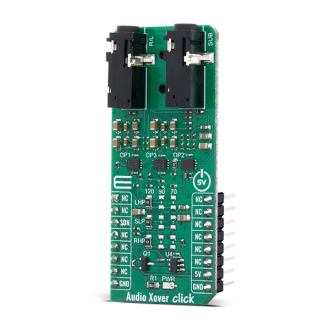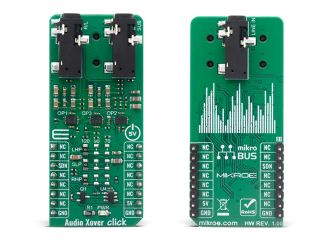
We strongly encourage users to use Package manager for sharing their code on Libstock website, because it boosts your efficiency and leaves the end user with no room for error. [more info]

Rating:
Author: MIKROE
Last Updated: 2020-05-20
Package Version: 1.0.0.0
mikroSDK Library: 1.0.0.0
Category: Signal processing
Downloaded: 3305 times
Not followed.
License: MIT license
Audio Xover Click is an analog active crossover solution for two-way loudspeakers. The primary purpose of the crossover circuit in a loudspeaker is to split an incoming audio signal into frequency bands that are passed to the speaker or “driver” best suited.
Do you want to subscribe in order to receive notifications regarding "Audio Xover click" changes.
Do you want to unsubscribe in order to stop receiving notifications regarding "Audio Xover click" changes.
Do you want to report abuse regarding "Audio Xover click".


Library Description
Library contains function for enable and disable module.
Key functions:
void audioxover_set_mode( uint8_t state ) - This function set CS pin on 1 ( ENABLE ) and 0 ( DISABLE )Examples description
The application is composed of three sections :
void application_task ( )
{
mikrobus_logWrite( "***ENABLE****", _LOG_LINE );
audioxover_set_mode( AUDIOXOVER_ENABLE );
Delay_ms( 3000 );
mikrobus_logWrite( "***DISABLE****", _LOG_LINE );
audioxover_set_mode( AUDIOXOVER_DISABLE );
Delay_ms( 3000 );
}
Other mikroE Libraries used in the example:
Additional notes and informations
Depending on the development board you are using, you may need USB UART click, USB UART 2 click or RS232 click to connect to your PC, for development systems with no UART to USB interface available on the board. The terminal available in all MikroElektronika compilers, or any other terminal application of your choice, can be used to read the message.